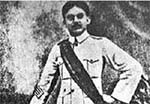 Kazi Nazrul Islam (1899-1976) had struck the scenario of Bangla poems with his entry like a ‘comet’, a title attributed to him by Rabindranath Tagore who ardently believed that Nazrul had germinated new petals of spirit amongst the Bengali readers. Nazrul was a poet of new genre who created a tremor in the world of Bengali literature. His poems and songs were composed with such rebellious utterances that were never heard or seen before. He rejuvenated the new generation with a mantra (an incantation) of rebellion against all social injustice and oppressions forced upon the people of subcontinent India including the Bengal region by the British Colonial Rulers.
Kazi Nazrul Islam (1899-1976) had struck the scenario of Bangla poems with his entry like a ‘comet’, a title attributed to him by Rabindranath Tagore who ardently believed that Nazrul had germinated new petals of spirit amongst the Bengali readers. Nazrul was a poet of new genre who created a tremor in the world of Bengali literature. His poems and songs were composed with such rebellious utterances that were never heard or seen before. He rejuvenated the new generation with a mantra (an incantation) of rebellion against all social injustice and oppressions forced upon the people of subcontinent India including the Bengal region by the British Colonial Rulers.
I can only compare Nazrul’s famous ‘Bidrohi’ (Rebellious) poem with only another poem ‘Elegy written in Country Church-yard’ by English poet Thomas Gray. Nazrul’s ‘Bidrohi’ swept the world of Bengali poems like a storm. From our childhood days until present, we recite Nazrul’s ‘Bidrohi’, the extra-ordinary poem which has given vent to anger and protests bottled inside us against all wrong-doings by the hierarchy with vested interests. The poem is a slogan against the shackles of both physical and mental freedom. It also came as surprise to the readers of ‘Bidrohi’ that how a poet with no formal education had traversed the entire cosmos and imbibed knowledge from diverse myths, legends and sacred books. The poem is also an epitome wherein love and rebellious traits of mankind co-exist. In fact, ‘Bidrohi’ is a great voyage through the path of love and fury adorned with unusual uses of metaphors, allegories and similes.
I have dealt elaborately with Nazrul’s one poem but his other poems dedicated to humanity including ‘Agni Beena’, ‘Bisher Bashi’, ‘Shammobadi’, ‘Jhinge Phul’, ‘Phoni Monosha’ are equally powerful. He was exclusively the voice of greater mass and humanity and truly a rebellious poet justifying the term to its brim.
Kazi Nazrul Islam is regarded as a maestro both as a composer as well as a singer. He created the notations for his own songs based on classical ragas and neo-classical lay-outs. His songs were a great inspiration to Bengalis during the war of independence in 1971. He had written a good number of powerful short stories and novels; several of which have been adapted as successful television and stage plays. Nazrul’s essays were remarkable both in content and also in terms of the use of forthright language. His rebellious essay against the unjust British colonial rule ‘Rajbondir Jobanbondi’ will live in history of mankind as rebellious expressions against the mortal and mental captivation of human beings.
Unfortunately for us, Kazi Nazrul Islam’s creative period lasted for only about 30-35 years as he met his demise in 1941 after suffering for years due to an incurable illness. Even then he left a literary ocean in which we can take dips to our hearts’ content till the end of time. In his 114th birth anniversary, I salute our immortal national poet.
The writer is an actor-director-writer
-With New Age input




















